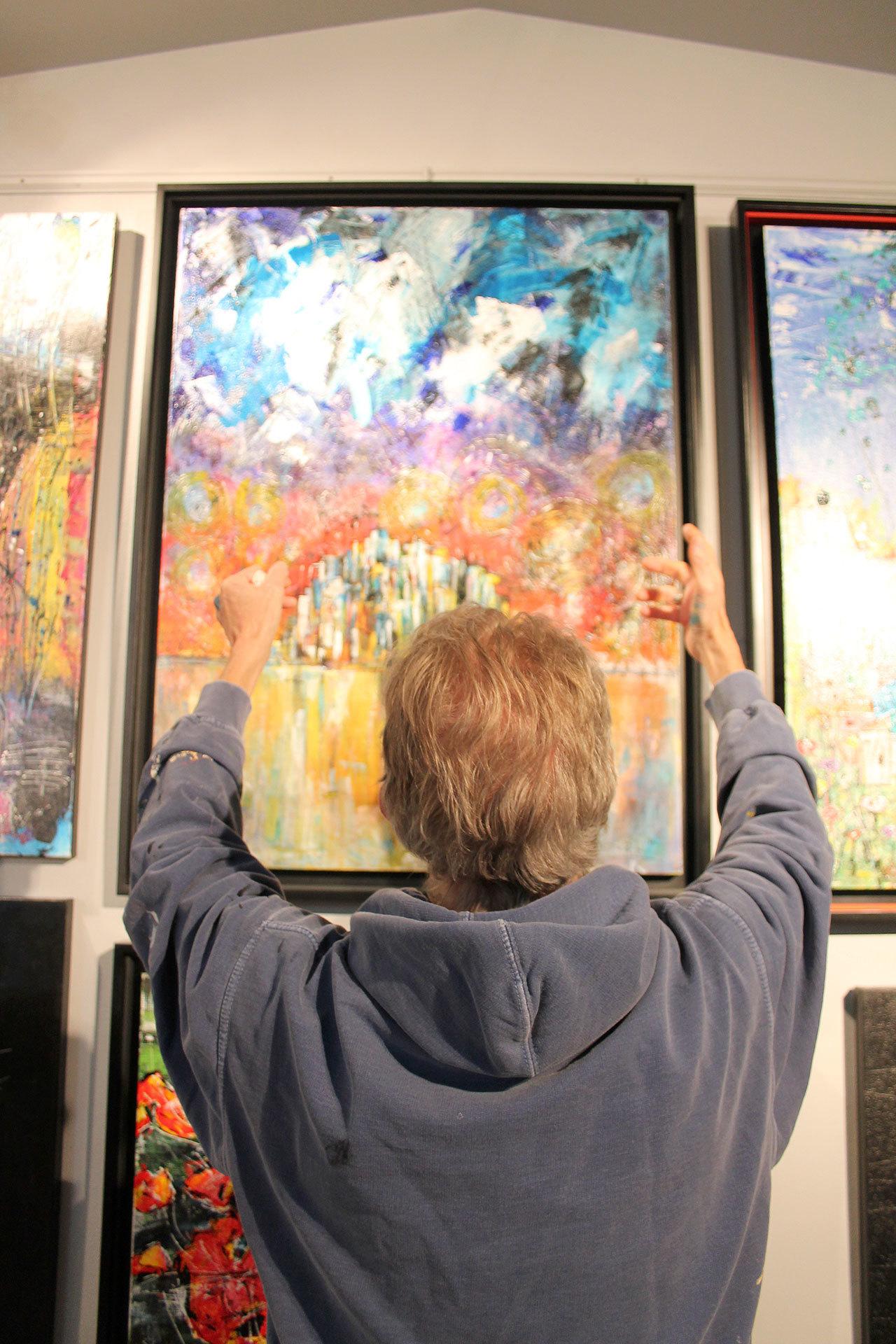Langley-based artist Louie Rochon admits, of course, that form and technique are crucial to art.
But for him, the best pieces create themselves, when emotion overpowers what can be learned from a class or a mentor.
That’s why Rochon’s work is directly tied to his personal experiences living with the ups and downs of clinical depression and bi-polar disorder.
“To me, a great artist is someone who fully and honestly expresses themselves in their work,” Rochon said. “Technique and style, of course, play a part in the creative process, but real art is honest expression to the core.”
What ends up on canvas often comes down to Rochon’s emotions. His repertoire takes viewers through high highs and the lowest of lows, which follow his state of mind at the time of creating the piece. Some of his work is warm and colorful, often depicting blossoming flowers in front of a sprawling field, while others have ridged and aggressive lines in abstract works.
The way he paints also depends on his mood. Rochon often uses plaster knives to paint rounded figures for his paintings that evoke happiness. But when he is frustrated, sometimes even in an admittedly manic state, Rochon paints in quick, sharp and often erratic movements with thin brushes or sticks. The end result is line work which makes the paintings pop and give the pieces a sense of raw emotion. He says the most critically well -received paintings are his more abstract, aggressive works created in a frustrated or manic state.
“I would say that my artwork clearly demonstrates the polar opposites,” Rochon said. “They demonstrate a full range of emotions, plus some statements I felt I had to make.”
Rochon primarily paints with acrylics on canvas these days, after years of working with paper maché and macro photography out of his Langley home. He transitioned to paint after feeling that the other mediums didn’t allow him to fully express himself. While he had a passion for photography and built an online following, he grew less interested in photography since he was photographing a subject that he didn’t create himself.
“Painting has been good for him,” Sandy Rubini, Rochon’s partner, said. “He was great at photography, but he got a bit bored with it and wanted to be able to more effectively get his emotions across. It’s a good fit, because he’s a brilliant painter.”
Rochon’s road to painting, and art in general, is a long and winding one. He made a “fortune” up north in the real estate industry in what he called “The Great Alaska Real Estate Boom of the ’80s.” The memories he describes are reminiscent of the Martin Scorsese film, ‘The Wolf of Wall Street’ — boats, luxury cars, alcohol and a fair share of stimulants. This was before his conditions were diagnosed, and he was confused about the depressed feelings that overtook him when the market dried up. He moved to Seattle to start anew, but filed for bankruptcy and took up the bottle. This was a cycle that would repeat numerous times.
After moving into the marketing industry in Seattle and building another fortune, he found himself back at square one after working himself mad once again, with the underlying issues of clinical depression and bi-polar disorder present. He needed to do something extreme. So he decided to pack a bag, walking stick and sunscreen and walk from Miami to Seattle. Expecting media coverage, he decided to do it for a cause to raise awareness. He landed on pediatric AIDS. His life had purpose again, at least for the two years while on his cross-country walk.
“It was the best and worst experience of my life, and I wouldn’t take it back for anything,” Rochon said. “But after my walk, I went into a dark place. I didn’t know what to do with my life.”
That was around the time Rochon turned to art. He wanted to express himself and tell his story through a medium. Now, he’s extremely in tune with his emotions and embraces his conditions. In fact, his conditions spill out onto his canvas.
“My work is loud, expressive and bold,” Rochon said. “It screams; there is nothing subtle about my work. Whether my works conveys mania, depression, excitement or joy, it’s all passion.”
Rochon moved his working space into a 600 square foot studio at 5075 Langley Road in August. Visitors can come by to see his work on Fridays from 1:30 p.m. to 6:30 p.m. or by appointment. To contact Rochon, email uswalker3@outlook.com or visit www.louierochonphotography.com


